“So what do you actually do?” is one of the nicer responses I get when people find out I’m a high school librarian. It’s certainly better than “I wish I had a job where I could just read all day” or “Do kids even read anymore?” (I wish I had a job like that too, and yes, they still read.) Even within the education world, fellow teachers and administrators don’t always realize that school librarians are, in fact, certified teachers and that we do a whole lot more than scan books in and out and shush children.
Some people at least have a sense of what an elementary school librarian does, but because most secondary school librarians don’t have a full or rigid teaching schedule, many can’t fathom what on earth we do all day. To be fair, I’m not sure I fully did either until I stepped into the role. But this lack of understanding among stakeholders is problematic and makes advocacy much more difficult. I’ve learned the hard way that when administrators don’t understand the scope of what I do, the “other duties as assigned” quickly pile up.
Here’s a non-exhaustive list of my current duties, official and unofficial, and the kinds of tasks each includes. Each secondary librarian may have a slightly different list depending on the needs and expectations of their school, but there will be a lot of overlap.
Student Support
⬥ Create and maintain a welcoming and safe learning environment
⬥ Communicate and uphold library behavioral expectations
⬥ Help students locate relevant resources
⬥ Suggest books based on student’s interests
⬥ Guide students in research tasks
⬥ Help students with homework
⬥ Provide technology assistance
⬥ Lead student book club (and occasionally other clubs)
⬥ Structure and facilitate individual passion projects
Teaching
⬥ Collaborate with teachers to design meaningful lessons that support the curriculum
⬥ Teach students literacy, research, and thinking skills
⬥ Lessons topics include:
- Creating a research plan, formulating research questions, brainstorming subtopics and keywords, broadening or narrowing a topic to fit the scope of the assignment
- Finding online sources: adjusting search terms, Boolean operators, using advanced filters
- Evaluating sources for credibility, fact checking, avoiding bias and misinformation, lateral reading
- Navigating academic databases
- Finding relevant information in books, using text structures to locate information efficiently
- Building an outline and elaborating from it to create a final product
- Effective peer editing strategies
- Using digital tools to present research/learning
- Avoiding plagiarism, respecting copyright, Creative Commons
- Bibliographies, Works Cited, in-text citations
- Building creativity (FFOE, brainstorming do’s and don’t’s, SCAMPER, divergent thinking, etc.)
Teacher Support
⬥ Curate research resources (print and digital) that support curriculum (for projects and just for general availability)
⬥ Help teachers find/evaluate digital resources to incorporate into curriculum
⬥ Informal instructional support (lesson/unit sounding board)
⬥ Review PLC data and co-create extension/enrichment
⬥ Catalog, barcode, circulate, and inventory textbooks
⬥ Help with technology issues
⬥ Proctor quizzes and tests on teacher request
Collection Management
⬥ Circulate materials (check out, check in, renew, etc.)
⬥ Maintain organized statistical records
⬥ Organize resources according to an established system, and modify as needed to increase circulation and ease of access
⬥ Weed resources from the collection as they become obsolete, out-of-date, or irreparably damaged
⬥ Reshelve returned materials
⬥ Perform yearly inventory
⬥ Repair books as needed
Collection Development
⬥ Manage library budget
⬥ Evaluate collection along various dimensions such as diversity, reading levels, students’ interests, etc.
⬥ Read widely and stay up to date on available titles (not on contract time currently to avoid promoting stereotype)
⬥ Determine new materials to be added to the collection based on students’ interests, collection gaps, diverse representation, quality of writing, literary awards, professional reviews, etc.
⬥ Create and manage catalog entries to aid students in locating materials
⬥ Generate barcodes and apply protective covers to new books
⬥ Apply for grants, complete documentation for awarded grants
Library Programming
⬥ Plan, promote, and execute library programs and events, including:
- Author interviews at our local (major) book festival
- Author visits
- Banned Books Week
- Black History Month and other similar celebrations/learning opportunities
- Book fairs
- Enrichment board games
- Field trips
- Love of Reading Week
- Makerspace activities (work in progress)
- NaNoWriMo
- Reading challenges
- Student book reviews
- Student project exhibits
- Themed book displays
Technology
⬥ Manage and maintain student Chromebooks (650+ at my school)
⬥ Prepare devices for state testing, AP exams, PSAT, etc. (charge, functionality checks, run updates, etc.)
⬥ Troubleshooting
⬥ Provide support and training to teachers on new digital tools they want to use (e.g. Google apps, Pear Deck, Canva, HyperDocs, ChatGPT, Magic School, etc.)
⬥ Update and maintain library’s website and social media
⬥ Update school website
⬥ Teach students technology skills, organically in the library setting as needed and as classroom lessons
- Digital tools and computer skills
- Using Google apps for academic success (e.g. organization, time management, etc. through Drive, Tasks, Gmail, bookmarks, Keep, Google Calendar, etc.)
- Digital citizenship
- Social media use (finding a healthy balance and using your influence for good)
Oh and also…
I’m an active member of our school’s Instructional Council and Site Council, I regularly engage in professional development, and as a member of our regional gifted education network, I’m developing two online professional development courses right now for my fellow educators. While the details vary, my fellow school librarians are also leaders in their schools (formally and/or quietly), lifelong learners, and advocates for all their students.
What now?
Phew.
Secondary librarians, feel free to steal language from this list (or the entire list) in your own advocacy efforts. Maybe it can spark a conversation that helps you renegotiate your workload or rewrite your job description. If you have any success, please let me know! Also, check out my previous post with a simple activity to create some positive library buzz for School Library Month and the Instagram graphics I’ve shared at the end of this post.
Library supporters, I encourage you to share this post with school district leaders and governing board members. If more decision-makers understand what we’re already doing, maybe they’ll think twice before adding even more “other duties as assigned” to our to-do lists.
Instagram advocacy
In anticipation of National School Librarian Day tomorrow, I wanted to share these Instagram graphics you can use to dispel some of the common misconceptions about our profession. These are modified from infographics created by The Lagniappe Librarian. Please keep those credits on the slides if you choose to share them, but you do not need to credit/cite me (although I’ll certainly appreciate it if you do).

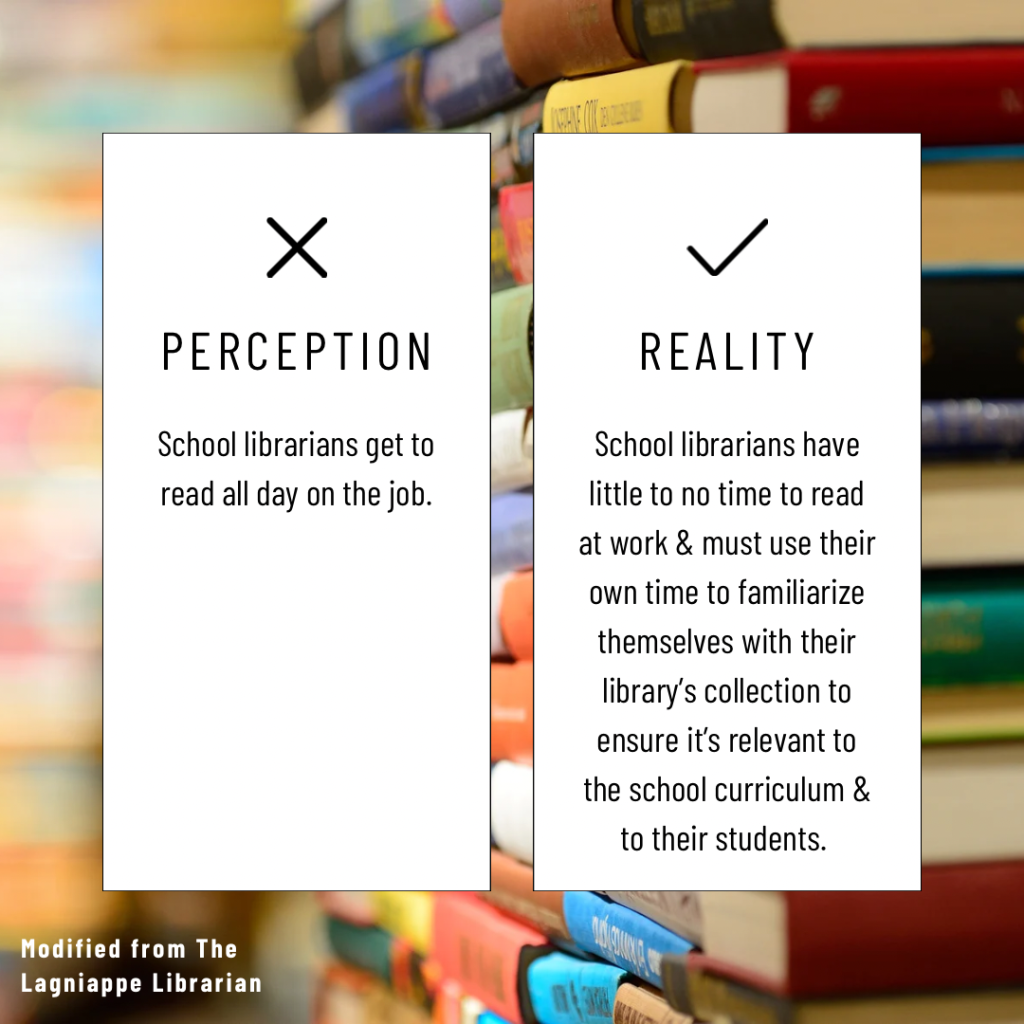
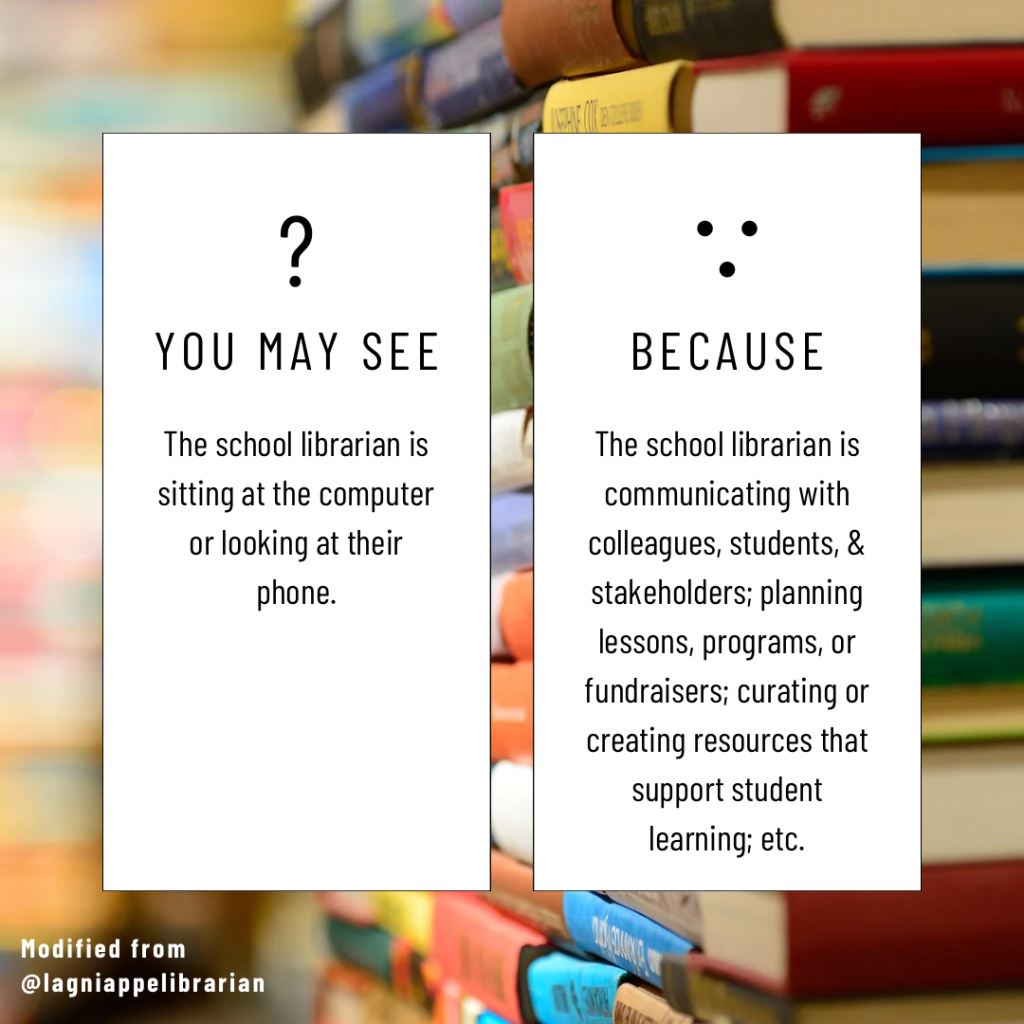


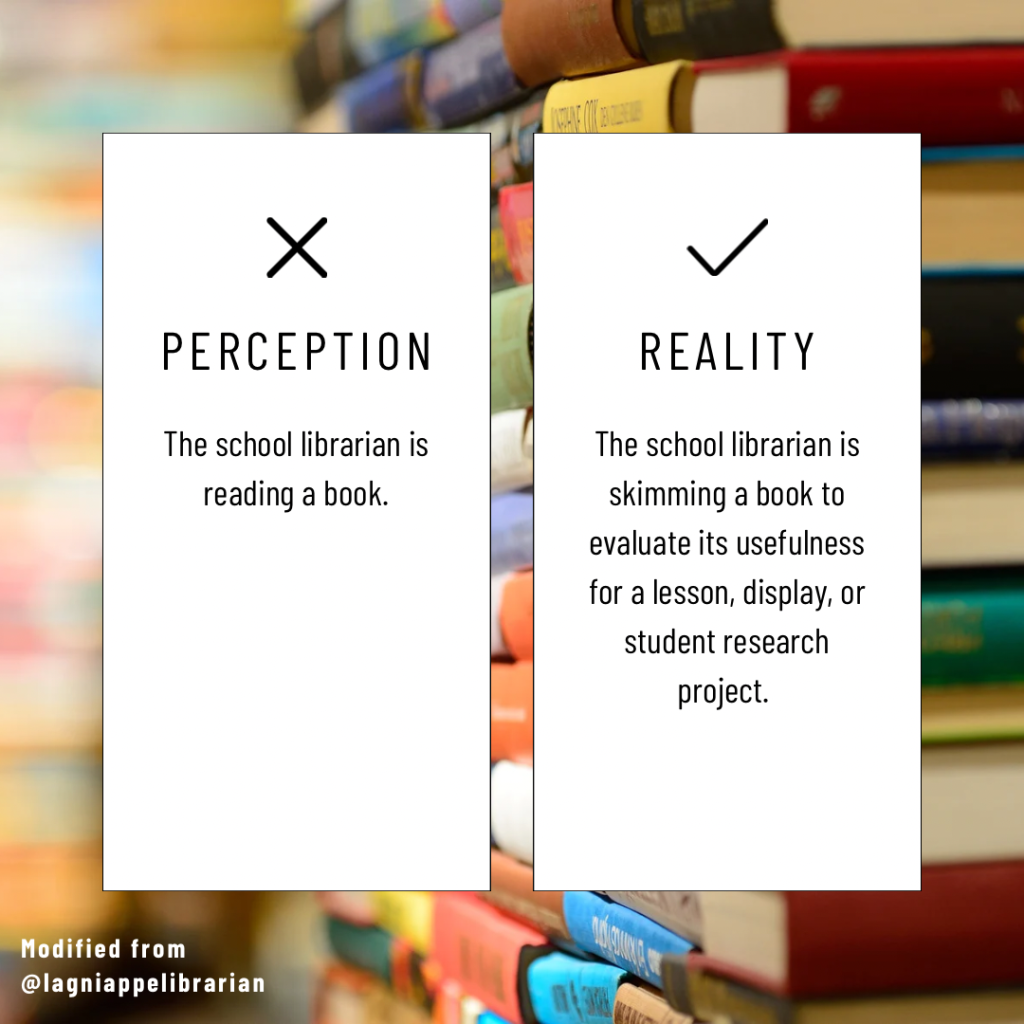
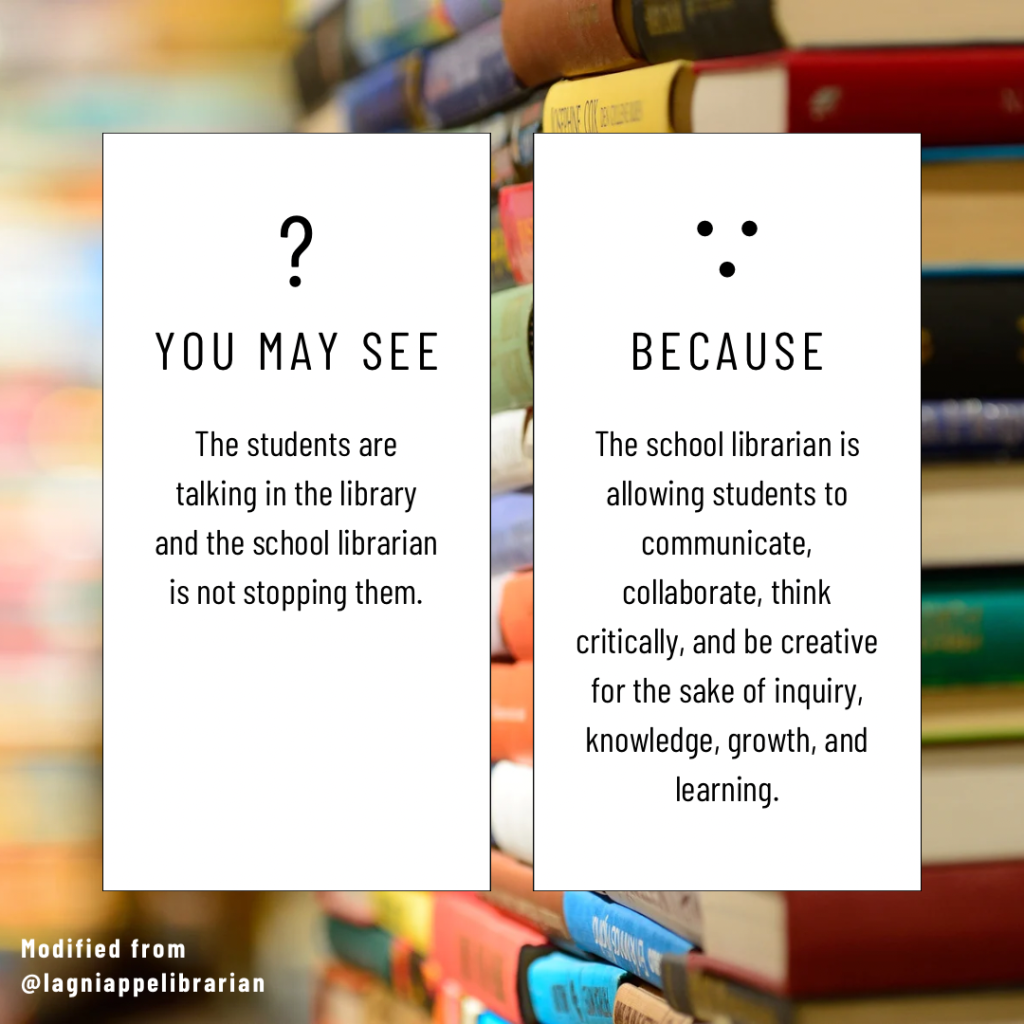

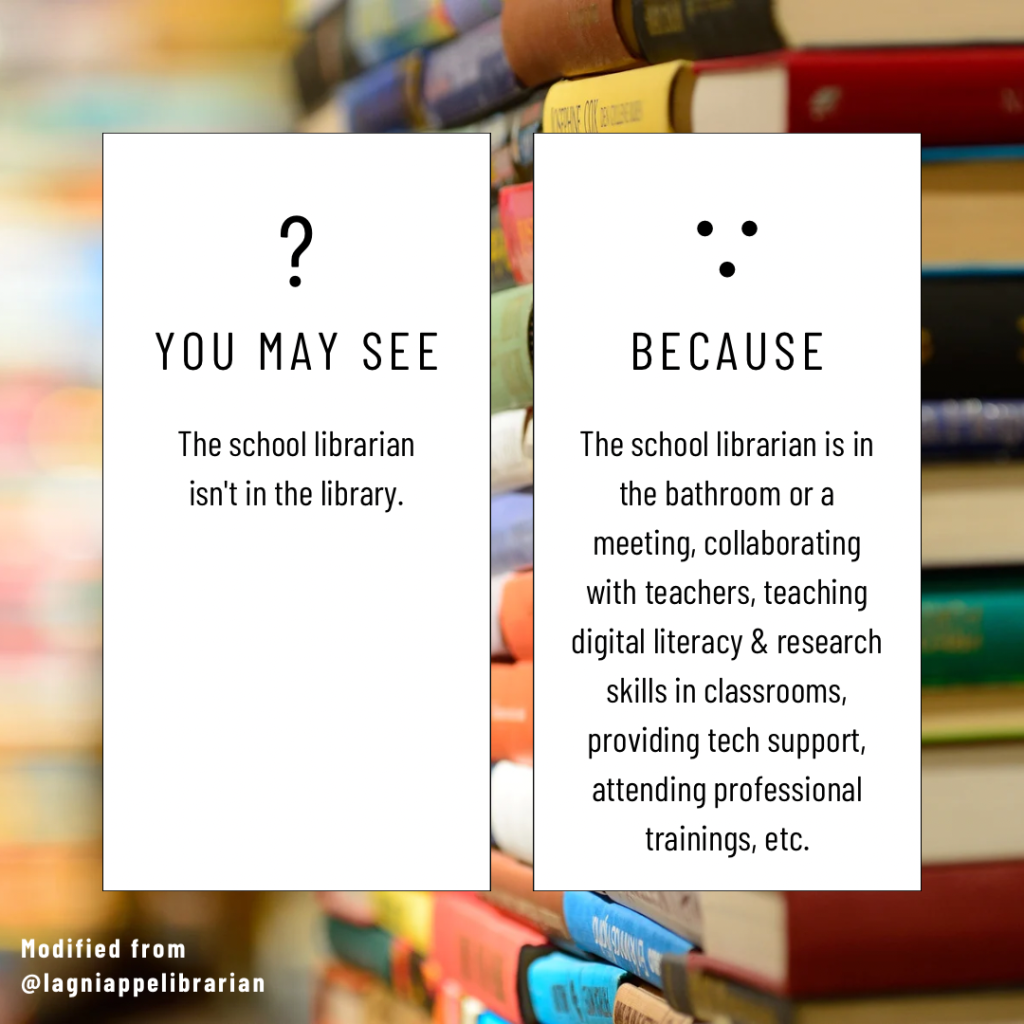

What did I miss?
What else falls to you as a secondary librarian? Add it in the comments.
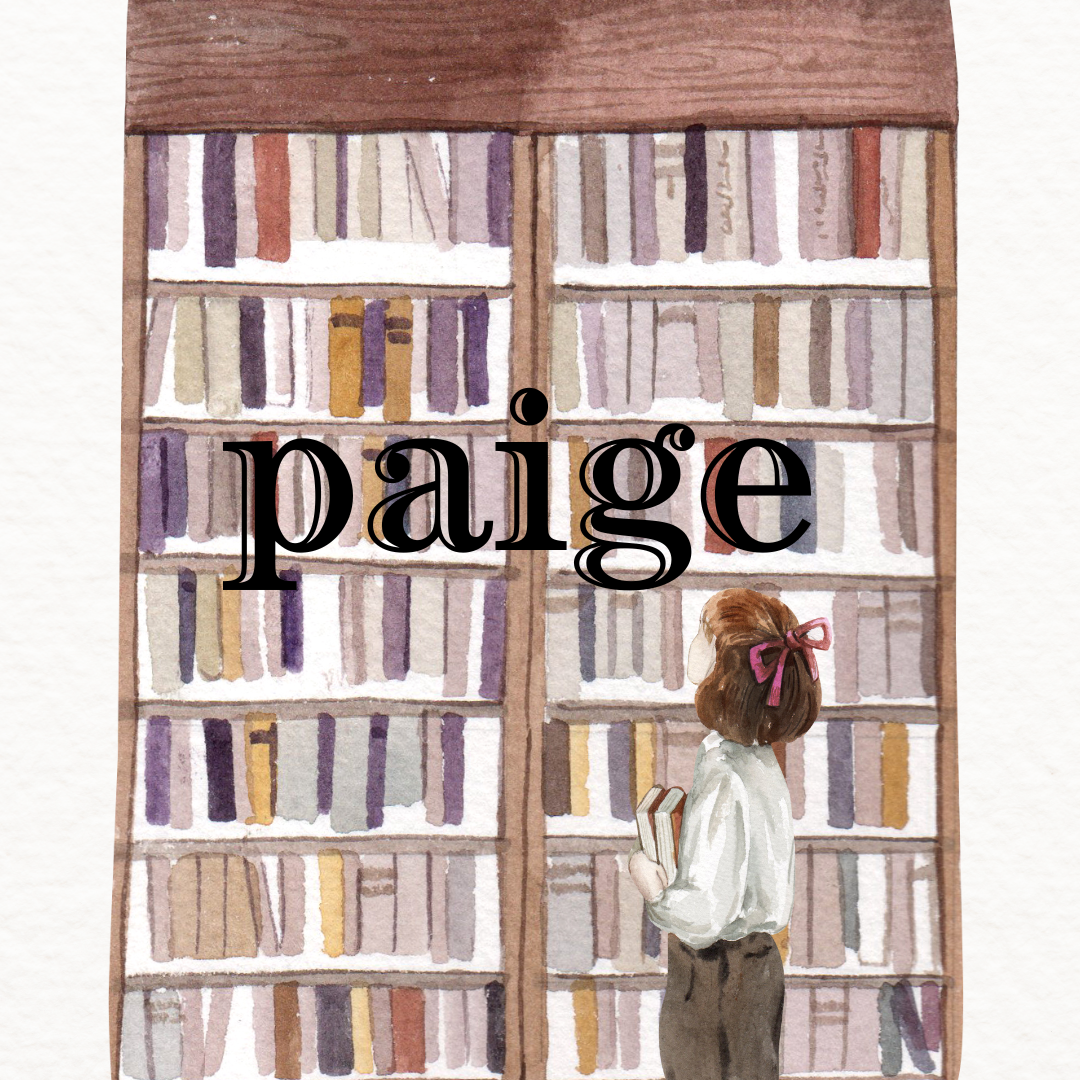
Leave a comment